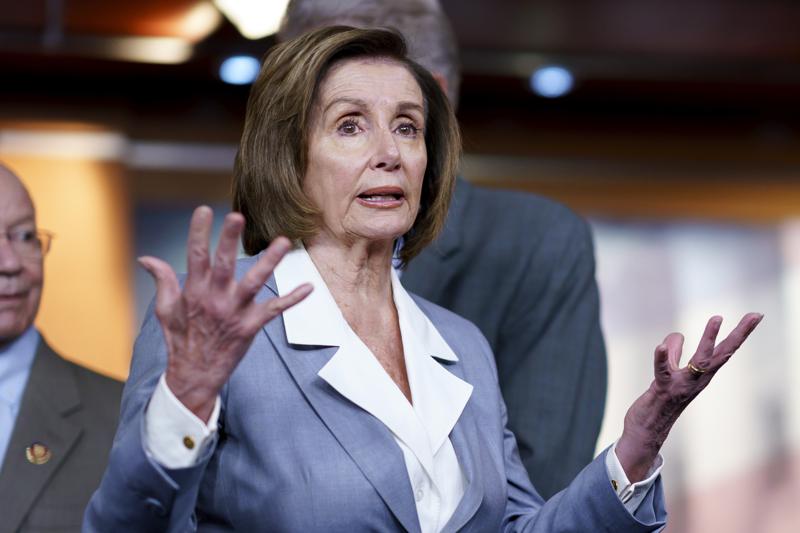Yes, the Speaker Got the First Votes She Needed on Biden’s Giant Infrastructure Plan, But It’s Far from a Done Deal
The preliminary win to advance President Biden’s huge social services spending bill is being depicted as a parliamentary victory for House Speaker Nancy Pelosi over a small group of would-be Democratic spoilers.
A day or more later, what looks more likely:
- While the specifics did show Pelosi’s legislative skill, the important, if narrow, victory here is for an aggressive agenda to help a lot of people – despite unanimous objection from Republicans. There is way too much focus on the mechanics involved.
- The same things that prompted a fissure between “progressives” and a group of nine “moderates” among Democrats did not disappear, and we will see them resurface as the bill itself gets real. The full expectation is that the final spending number will be less than $3.5 trillion first described to ensure that there are the votes for even one-party passage.
This highlights our American obsession with winning rather than focusing on the basics.
As The New York Times summarized, “For now, the deal that Ms. Pelosi struck amounted to a precarious détente for Democrats that did nothing to resolve tensions between the moderate and liberal flanks or end the jockeying for political leverage.”
It’s an important distinction because there is no bill yet for infrastructure spending—small, medium or huge—in place yet. And, other than general support for the substance over the timing of votes, there are lots of ways that this discussion about investing in our next 10 years still can go south.
As it stands, this contested vote essentially only lays the groundwork for Democrats to force through both a $1 trillion bill to fix roads, bridges, airports and a lot of rural broadband wiring and the three-times larger bill to address spending on “human infrastructure.” Included would be an array of improvements to universal pre-K education, health and prescription drug access and pricing, expanded Medicare coverage, child-care tax write-offs, paid leave and tax increases for the wealthy and corporations.
It’s an important step, of course, but what we should remember is that Pelosi was forced to deal with a handful of “moderates” who basically don’t support the full package.
What Pelosi Did
In case you were living your life and managed to avoid worrying about Congress, the group of nine moderates wanted an immediate vote on the already Senate-passed bipartisan hard infrastructure bill. Pelosi wanted to twin the two spending packages. What happened was, according to a variety of press reports and congressional statements, extended legislative negotiation.
Pelosi’s particular way out was to link all the spending under a singular rule vote that would set a Sept. 27 deadline for a vote on the roads bill, setting up the possibility for House committees to vet the social services programs and price them for a simultaneous vote. She won the day, but, obviously, there’s not a lot of time to assess both the actual cost of these sprawling programs and to ensure the politics for passage.
Basically, Democrats want to use the so-called budget reconciliation rules to cram all the spending together in bills that can be passed by as little as a single-vote majority. That is a real prospect in the Senate. In the House, there was an eight-vote majority for this measure, which is likely the maximum it can achieve in an up-and-down vote for final approval.
Politico and other media have attempted to revisit all the back-and-forth conversations and late-night haggling between Pelosi (D-Calif.) and her closest minions and the group of nine, headed by Rep. Jeff Gottheimer (D-N.Y.). It was a serious enough effort to force delay and to put the outcome in doubt.
To summarize, it turns out that Pelosi, House Majority Leader Steny Hoyer (D-Md.) and Majority Whip Jim Clyburn (D-S.C.) were able to separate and exploit individual concerns among the nine and to persuade them that they all need to pull in a single direction. We’ll never know if there were individual promises.
Afterward, Pelosi praised the rebel group for its “enthusiasm” while announcing her commitment to pass the infrastructure bill it had opposed.
Topping off the 220-212 vote on the eventual spending bill was approval for a voting rights measure that the House passed soon after.
Our Focus
This House showdown reminds us of the power of just a handful of people to hold up approval of legislation, court decisions or even who’s giving advice within the White House.
We keep thinking that we go to the polls every two or four years with the idea of setting an understandable direction for our democracy. But then we keep tripping up over those one- or two- or even nine-vote groups that decide that they are smarter than the rest of us.
We will go through this same discussion over what constitutes a fitting social services safety net for America when this big Biden spending package comes back to the Senate. We must depend on the peculiar waverings of Sen. Joe Manchin (D-W.Va.) and Krysten Sinema (D-Ariz.)
We think we’re voting for an agenda when we cast ballots for Biden or Donald Trump only to re-discover daily that there always is a single vote over in the corner of the House or Senate who insists on standing in the way of popular support, whether the issue is more gun control, abortion, environmental rules or economic issues.
It’s bad enough that we have gridlock resulting from near-equal numbers of Democrats and Republicans. It seems worse when one side or the other can’t line up its own folks – or free them from party commitments to specific legislative agendas. We expect that democracy is messy, but not daily.




